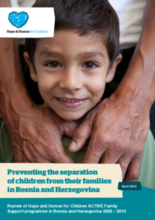ABOUT THE PROGRAM
Hope and Homes for Children has been implementing ACTIVE Family Support in Sarajevo Canton in BiH since 2003. The program consists of two elements: the prevention of separation of children from their parents as the primary focus, and the reintegration of separated children from institutions back into their biological families. This unique and holistic program is tailored to the individual needs of each child and family and it is built on the following core values: partnership, respect, inclusion, sustainability and the best interest of the child. Institutions are terrible places for children to grow up in. Today there is consensus that institutional care is simply not compatible with a human rights-based approach, it does not serve the best interest of the child and does not recognize the unique needs of individuals. Moreover, it does not include parents and communities; on the contrary it builds barriers and leads to isolation and stigma. Without a loving family environment, adult role models and strong, healthy attachments, children’s intellectual and emotional development is delayed, as is their physical and neurological development.
Families who are referred to Hope and Homes for Children are helped to assess their strengths and needs across six wellbeing domains: living conditions, family and social relationships, behavior, physical and mental health, education, employment and household economy. Based on the outcomes of the assessment, families are engaged in developing a support plan and are assigned a support team consisting of social workers, pedagogues and psychologists who work intensively with the parents and the children for a set period of time.
MAJOR FINDINGS
During the period 2003 to 2010, the programme supported 878 people (499 children and 379 adults) from 255 families. The key learning and significant outcomes are:
• The main risk factors of children’s separation from their parents in BiH are poverty, unemployment, having three or more children in the family, insecure housing and single-parent families
• HHC was successful in preventing the separation of children from their families in 98% of cases
• Children’s lives improved in all six wellbeing domains
• 88% of families maintained their progress in the year following the end of our support, highlighting the effectiveness of the time-bound approach
• 82% of children left institutions and were successfully reintegrated into their biological families; 14% left large institutions to live with foster families
RETURN ON INVESTMENT
The program also demonstrated a significant return on investment. The cost of the ACTIVE Family Support Program from 2003-2010 was €441,560, an average total of €921 per child. This includes the costs of staff salaries and overheads, as well as direct support to children and their families.
We estimated that 32% of the children would have been placed in an institution had they not accessed ACTIVE Family Support. The total cost of institutional placements for these children would have been approximately €4,123,250. The amount that would have been incurred by the government in the absence of ACTIVE Family Support would therefore have been 9.33 times greater than the total cost of implementing the ACTIVE Family Support program. Thus every Euro invested provided a return of €9.33.

